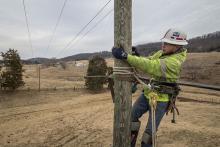In May, Connecticut’s Public Utility Regulatory Agency (PURA) struck a blow at local authority when the ruled that communities could not use their protected utility pole space for municipal fiber deployment. Big cable and telephone companies cheered, broadband advocates and communities that need better connectivity decided to take action. Now, PURA faces lawsuits that challenge the decision from the Office of Consumer Counsel (OCC), the Connecticut Conference of Municipalities (CCM), and at least three local communities that just want high-quality Internet access.
Long Wait
The focus of the controversy is Connecticut’s Municipal Gain Space Law, which was first established in the early 1900s to guarantee municipalities the ability to hang telegraph wires. The municipal gain space is a location on all utility poles — publicly or privately owned — situated in the public right-of-way. After multiple law suits over the years in which cities and the state typically won, Connecticut’s legislature finally amended the language of the law to allow government entities to use the municipal gain space for “any use” in 2013.
Almost two years ago, we reported on the petition filed by the OCC and the State Broadband Office (SBO) with PURA asking for clarification on the law, which included establishing clear-cut rules on using the municipal gain space for fiber optic deployment. They felt the rules needed cleaning up because some incumbents in Connecticut were still finding ways to thwart competition and stop or delay plans for municipal fiber deployment.
 In addition to using restrictive pole attachment agreements, incumbents were exploiting the lack of definition in the statute to slow make-ready work, question who pays for make-ready work, and generally delay municipal projects. Time is money and losing momentum can drive up the cost of of a project, which in turn erodes a community's will to see it realized.
In addition to using restrictive pole attachment agreements, incumbents were exploiting the lack of definition in the statute to slow make-ready work, question who pays for make-ready work, and generally delay municipal projects. Time is money and losing momentum can drive up the cost of of a project, which in turn erodes a community's will to see it realized.
The Decision in Question





 In addition to using restrictive pole attachment agreements, incumbents were exploiting the lack of definition in the statute to slow make-ready work, question who pays for make-ready work, and generally delay municipal projects. Time is money and losing momentum can drive up the cost of of a project, which in turn erodes a community's will to see it realized.
In addition to using restrictive pole attachment agreements, incumbents were exploiting the lack of definition in the statute to slow make-ready work, question who pays for make-ready work, and generally delay municipal projects. Time is money and losing momentum can drive up the cost of of a project, which in turn erodes a community's will to see it realized.